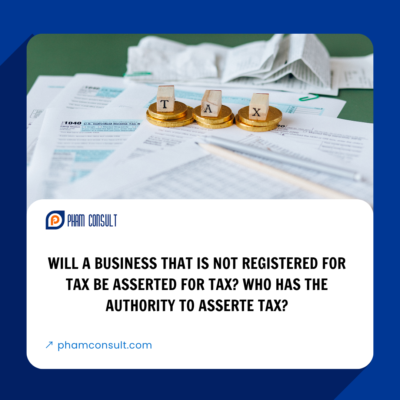Tax is imposed on taxpayers in case of tax law violations. Is a business that does not register for tax subject to tax assessment? Who is the authority that has the authority to assess tax? What is the responsibility of the tax authority in assessing tax? Through today’s article, let’s learn more about this issue with Pham Consult!

Is a business that does not register for tax subject to tax assessment?
According to Article 50 of the 2019 Law on Tax Administration, the provisions on tax assessment for taxpayers in case of tax law violations are as follows:
Tax assessment for taxpayers in case of tax law violations
1. Taxpayers are subject to tax assessment when they fall into one of the following cases of tax law violations:
a) Failure to register for tax, failure to declare tax, failure to submit additional tax records as requested by the tax authority or failure to declare tax fully, honestly and accurately on the basis for tax calculation;
b) Failure to reflect or failure to reflect fully, honestly and accurately the data in the accounting books to determine tax obligations;
c) Failure to present accounting books, invoices, vouchers and necessary documents related to determining the amount of tax payable within the prescribed time limit;
d) Failure to comply with tax inspection and tax examination decisions as prescribed;
dd) Purchase, sale, exchange and accounting for the value of goods and services not according to the normal transaction value on the market;
e) Purchasing or exchanging goods using illegal invoices, illegally using invoices while the goods are real as determined by competent authorities and have declared taxable revenue;
g) There are signs of absconding or dispersing assets to avoid tax obligations;
h) Conducting transactions that are not true to their economic nature or actual occurrence with the aim of reducing the taxpayer’s tax obligations;
i) Failure to comply with regulations on declaration obligations, determining transfer pricing or failure to provide information according to tax management regulations for enterprises with related-party transactions.
2. Basis for tax determination includes:
a) Database of tax administration agencies and commercial database;
b) Comparison of tax amounts payable by businesses with the same goods, industries, professions, and scale in the locality; In case the locality of the business establishment does not have information on the goods, industry, profession, and scale of the business establishment, compare it with other localities;
c) Valid documents and inspection results;
d) Tax collection rate on revenue for each field, industry, and profession according to the provisions of the law on tax.
Thus, the enterprise is subject to tax assessment when it does not register for tax at the request of the tax authority.
Who is the competent authority to assess tax according to current law?
According to Article 16 of Decree 126/2020/ND-CP, the regulations on authority, procedures, and decisions on tax assessment are as follows:
Authority, procedures, and decisions on tax assessment
1. Authority to assess tax
The General Director of the General Department of Taxation; the Director of the Tax Department; the Director of the Tax Sub-Department has the authority to assess tax.
2. Tax assessment procedures
a) When assessing tax, the tax authority shall notify the taxpayer in writing of the tax assessment and issue a tax assessment decision. The tax assessment decision must clearly state the reason for tax assessment, the basis for tax assessment, the tax amount, and the deadline for tax payment.
b) In cases where the tax authority conducts tax assessment through tax inspection or audit, the reason for tax assessment, the basis for tax assessment, the tax amount, and the deadline for tax payment must be recorded in the tax examination or audit record, and the tax handling decision of the tax authority.
c) In cases where the taxpayer is assessed tax according to regulations, the tax authority shall impose administrative penalties and calculate late tax payment fees according to the provisions of law.
Thus, the persons with the authority to assess tax include:
– General Director of the General Department of Taxation
– Director of the Tax Department
– Director of the Tax Sub-Department
What are the responsibilities of tax authorities in installing taxes?
According to Article 53 of the 2019 Law on Tax Administration, the responsibilities of tax authorities in determining taxes are as follows: – The tax authority shall notify the taxpayer in writing of the reasons for determining taxes, the basis for determining taxes, the determined tax and the deadline for paying taxes amount.
– In cases where the tax authority conducts tax determination through tax inspection or audit, the reasons for determining taxes, the basis for determining taxes, the determined tax amount, and the deadline for paying taxes must be recorded in the tax inspection or audit record, and the tax settlement decision of the tax authority.
– In cases where the tax amount determined by the tax authority is greater than the tax amount payable according to the complaint settlement decision of the competent authority or the judgment or decision of the Court, the tax authority shall refund the excess tax amount.
– In case the tax amount determined by the tax authority is less than the tax amount payable according to the complaint settlement decision of the competent authority or the judgment or decision of the Court, the taxpayer is responsible for paying the additional amount. The tax authority is responsible for determining the tax.
Thus, the tax authority has the above responsibilities in determining the tax.
Comments




 VI
VI